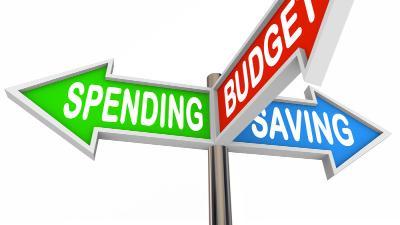How to Make a Budget Bearable
The budget. To many, it is simply known as the “b” word. The budget has turned into this scary thing that few people dare to discuss.
I’m not sure if it’s just overwhelming to think about tracking or if people fear seeing where they’re spending their money. Regardless of the reason, the budget is the foundation to anyone’s personal financial situation.
How are you going to make informed financial decisions if you don’t know how much money is coming in and where it’s being spent? It can be a little intimidating. However, the relief it will bring will put you so much more at ease, knowing you have a spending plan in place.
While I’m sure I haven’t convinced you yet to take this monumental step towards financial independence, let me lay out a few tips that will make the budgeting process much more bearable.
Work with your partner
If you don't have a partner, then work with someone you trust for personal finances. If you have a partner or are married, it’s imperative you go through this process.Working with a partner/spouse will ensure both of you are on the same page for where your money is going. Both of you have to be on board, and compromises might have to be made.
However, working with a partner will make the budgeting process a much more pleasant experience. You’ll get two perspectives, and you’ll have an accountability partner to ensure proper implementation and follow-through.
We’ve all heard the expression that two heads are better than one. This is true when going through something as “challenging” as creating a budget.
Accept there will need to be changes
Many people get all bent out of shape if things don’t go exactly to plan. Guess what, it won’t! Things happen, and life gets in the way. There will be expenses that pop up that you haven’t accounted for. That’s just part of it.Changes must be made. Adjustments must be made. You’re not going to account for everything in the beginning. Something will get missed. It’s just reality.
What’s important is you don’t get discouraged and throw the budget out the door. Stick with it and adjust it as necessary. You might have to increase one budget line item and decrease another. It’s okay; that’s life.
Stick with it and roll with the punches. Life throws us curveballs all the time, and creating a budget is no different. Don’t get discouraged and understand that changes are inevitable.
Start with a spreadsheet
That’s right. Start the old-fashioned way. There are plenty of fancy budgeting software out there today, but starting with a simple budget spreadsheet will force you to completely understand your budget.The spreadsheet budget is more manual, but that’s what you need when you’re starting. You need to get into the nitty gritty of your spending habits. A spreadsheet will force you to input all your outflows to confirm you’re following the budget.
A spreadsheet will form the budgeting habit for you. After you’ve completed it manually for a minimum of 6 months, I would recommend going to a more automated software. Often, though, I see that people stick with the spreadsheet because they’re already comfortable with it, and it forces them to look at it and update it at least on a weekly basis.
Check out our budget spreadsheet we use for our clients.
Block your calendar weekly
Block a one-hour timeframe on you and your partner’s calendar to update and review the budget. That’s the only way you will stay up to date with it.As we all know, if it’s not on the calendar, then it will not happen. I prefer Sunday or Monday evening, but it’s up to what works best for your schedule. Regardless of the day, just do it.
It will serve as a reminder, and you’ll see it on your calendar every time you look at it. It will also make you feel guilty if you skip it one week.
It will take a little while to get used to, but trust me, it will eventually turn into a habit. You’ll eventually look forward to doing it, because you’ll see the progress you’re making in your financial life.
Habits are hard to form, and this one is no different. Put it on the calendar and set plenty of reminders. You’ll eventually get there. I promise.
Don’t freak out if you go over budget
This goes hand in hand with accepting changes, but I wanted to mention this separately. It’s inevitable you will go over budget in certain categories monthly. I guarantee it will happen, so be prepared.Don’t freak out. Take a deep breath. Things will be okay. Understand why you went over budget and determine if it was a one-time occurrence or if you need to make adjustments.
Believe it or not, variable expenses will vary monthly. Variable expenses, such as travel, should be looked at annually and then divided by 12. There will be plenty of months when that travel line is $0, but eventually, vacation will have to be paid for, and hopefully, you budgeted correctly.
Regardless of the reason though, you will go over budget in certain categories. Just relax and don’t freak out. Nobody can budget perfectly, so accept that things must be adjusted.
Automate it
Once you have this habit formed by the manual method, you can then venture into the automated budgeting software that’s out there. They are a little slicker than an old-fashioned spreadsheet, but they’ll do the same thing, just in different ways.Automated budgeting software will sync with your checking account and credit card. Once synced, all transactions will filter directly into the budgeting software.
You will then need to create a budget for all the line items you have created in your initial spreadsheet. The software will try to sync your transaction into the correct budget category automatically, but you must make adjustments until the software learns where those transactions should be categorized.
While you don’t have to input your spending manually, you still must check it at least weekly to ensure transactions are being categorized correctly. Budgeting software is cool, but the spreadsheet works as well. It really depends on what you’re comfortable with and what you’re going to stick with.
The budget shouldn’t be a bad word. It shouldn’t be something you’re afraid of. It truly is the foundation of your personal financial life and will drive you to make the spending/saving decisions that are in your best interest. Take control of your financial life, and your budget will guide you to financial independence.
This is a post from Clint Haynes, a Certified Financial Planner® in Lee’s Summit, MO. He is also founder and owner of NextGen Wealth. You can learn more about Clint at the website NextGen Wealth.


